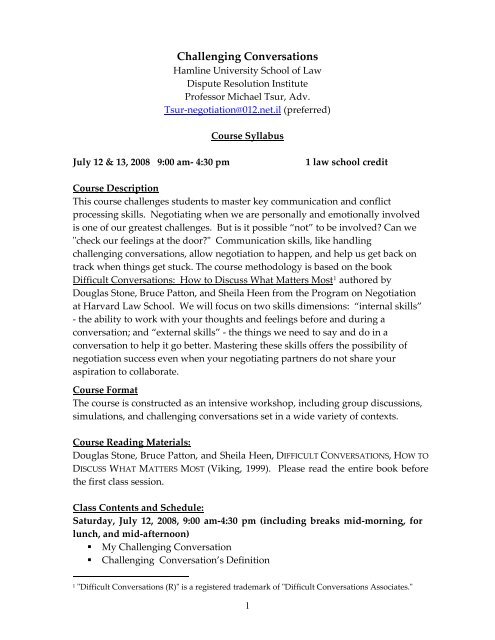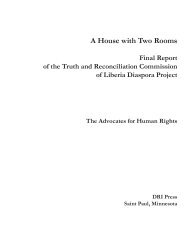ST/Negotiation (CRN 14793) - Hamline University School of Law
ST/Negotiation (CRN 14793) - Hamline University School of Law
ST/Negotiation (CRN 14793) - Hamline University School of Law
Create successful ePaper yourself
Turn your PDF publications into a flip-book with our unique Google optimized e-Paper software.
Challenging Conversations<br />
<strong>Hamline</strong> <strong>University</strong> <strong>School</strong> <strong>of</strong> <strong>Law</strong><br />
Dispute Resolution Institute<br />
Pr<strong>of</strong>essor Michael Tsur, Adv.<br />
Tsur‐negotiation@012.net.il (preferred)<br />
Course Syllabus<br />
July 12 & 13, 2008 9:00 am‐ 4:30 pm 1 law school credit<br />
Course Description<br />
This course challenges students to master key communication and conflict<br />
processing skills. Negotiating when we are personally and emotionally involved<br />
is one <strong>of</strong> our greatest challenges. But is it possible “not” to be involved? Can we<br />
ʺcheck our feelings at the door?ʺ Communication skills, like handling<br />
challenging conversations, allow negotiation to happen, and help us get back on<br />
track when things get stuck. The course methodology is based on the book<br />
Difficult Conversations: How to Discuss What Matters Most 1 authored by<br />
Douglas Stone, Bruce Patton, and Sheila Heen from the Program on <strong>Negotiation</strong><br />
at Harvard <strong>Law</strong> <strong>School</strong>. We will focus on two skills dimensions: “internal skills”<br />
‐ the ability to work with your thoughts and feelings before and during a<br />
conversation; and “external skills” ‐ the things we need to say and do in a<br />
conversation to help it go better. Mastering these skills <strong>of</strong>fers the possibility <strong>of</strong><br />
negotiation success even when your negotiating partners do not share your<br />
aspiration to collaborate.<br />
Course Format<br />
The course is constructed as an intensive workshop, including group discussions,<br />
simulations, and challenging conversations set in a wide variety <strong>of</strong> contexts.<br />
Course Reading Materials:<br />
Douglas Stone, Bruce Patton, and Sheila Heen, DIFFICULT CONVERSATIONS, HOW TO<br />
DISCUSS WHAT MATTERS MO<strong>ST</strong> (Viking, 1999). Please read the entire book before<br />
the first class session.<br />
Class Contents and Schedule:<br />
Saturday, July 12, 2008, 9:00 am‐4:30 pm (including breaks mid‐morning, for<br />
lunch, and mid‐afternoon)<br />
My Challenging Conversation<br />
Challenging Conversation’s Definition<br />
1 ʺDifficult Conversations (R)ʺ is a registered trademark <strong>of</strong> ʺDifficult Conversations Associates.ʺ<br />
1
The Three Inner Dimensions<br />
Internal Skills ‐ The Five Shifts<br />
Preparation Stage<br />
Exercise : Preparing to a Challenging Conversation<br />
Conducting a Challenging Conversation<br />
External Skills ‐ Opening Sentence<br />
Sunday, July 13, 2008, 9:00 am‐4:30 pm (including breaks mid‐morning, for<br />
lunch, and mid‐afternoon)<br />
Stories Exchange – Inter‐Active Listening+ simulation<br />
Stories Exchange – Framing, Re‐framing and Transparency<br />
The Problem‐Solving Process<br />
Method Implementation<br />
Course Grading Policy:<br />
Grades will be based on the following:<br />
1. Attendance and Meaningful Participation (25% <strong>of</strong> course grade)<br />
Class participation is an integral part <strong>of</strong> the learning process in this course. It<br />
includes mandatory attendance, preparation for and participation in class<br />
exercises, and active participation in class discussions.<br />
2. Written Assignments and Oral/Video Summary (75% <strong>of</strong> course grade)<br />
There are two required writing assignments (the second <strong>of</strong> which includes the<br />
requirement to orally present a summary (either on video or audio tape):<br />
a) After the first session the students will be required to write a one page<br />
personal reflective essay on the session materials and simulations (1 pg.,<br />
double‐spaced, 12 point font, with standard margins). Bring your essay to<br />
the second class. This essay is worth 15% <strong>of</strong> the course grade<br />
b) Final assignment‐ an analytical report on a personal experience<br />
regarding the implementation <strong>of</strong> the challenging conversation suggested<br />
method: from preparation, to learning stage, until the conclusions (6‐8<br />
pages, double‐spaced, 12 point font, with standard margins). You must<br />
also orally “present” your report either on video or audio tape. 2 This<br />
written analytical report and oral summary is worth 60% <strong>of</strong> the course<br />
grade and is due no later than 4:30pm, Monday, July 28, 2008 in the<br />
<strong>Hamline</strong> <strong>University</strong> <strong>School</strong> <strong>of</strong> <strong>Law</strong> Registrar’s Office. You must keep a<br />
copy <strong>of</strong> your report and obtain a time‐stamped receipt when you turn it<br />
2 More detailed information about acceptable media formats will be provided during the first class.<br />
2
in. Students not residing in the Twin Cities may mail their report to Debra<br />
Bergh<strong>of</strong>f, Dispute Resolution Institute, 1536 Hewitt Ave., St. Paul, MN<br />
55104. The report must be mailed priority mail and post‐marked no later<br />
than July 28. I strongly suggest you obtain a receipt from the post <strong>of</strong>fice in<br />
case you need to verify that the paper was mailed on time.<br />
3

















